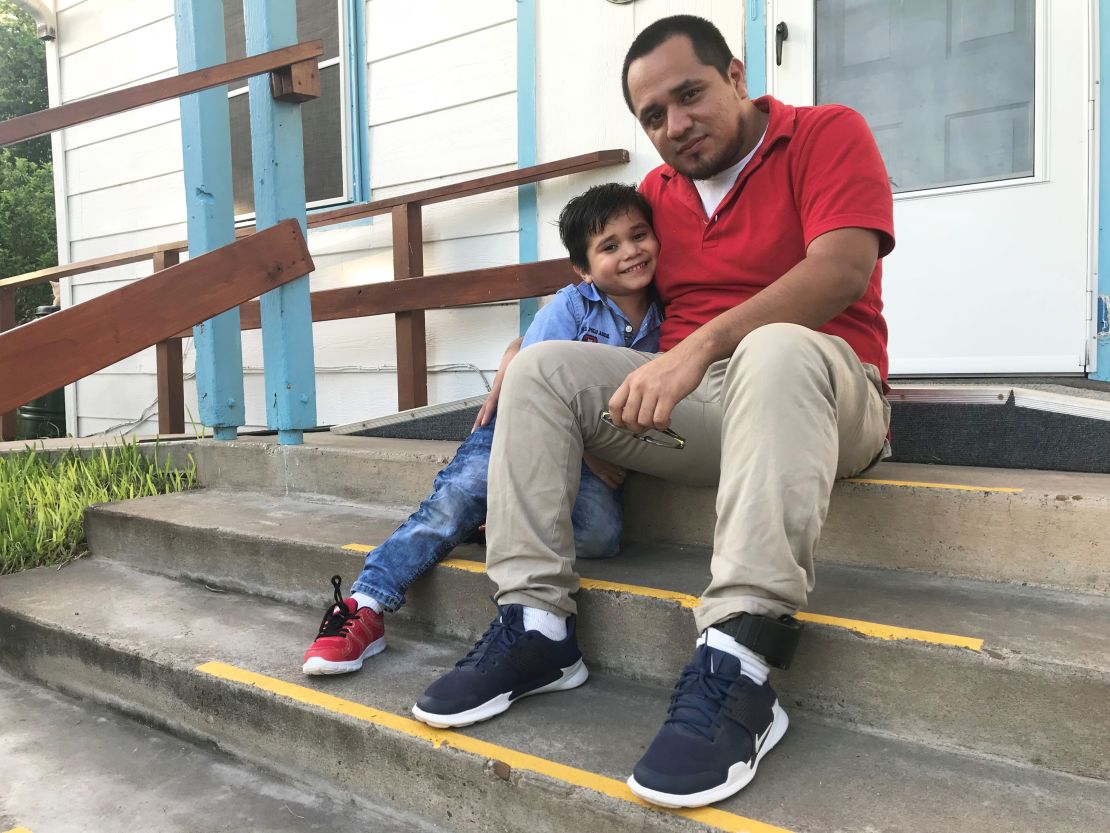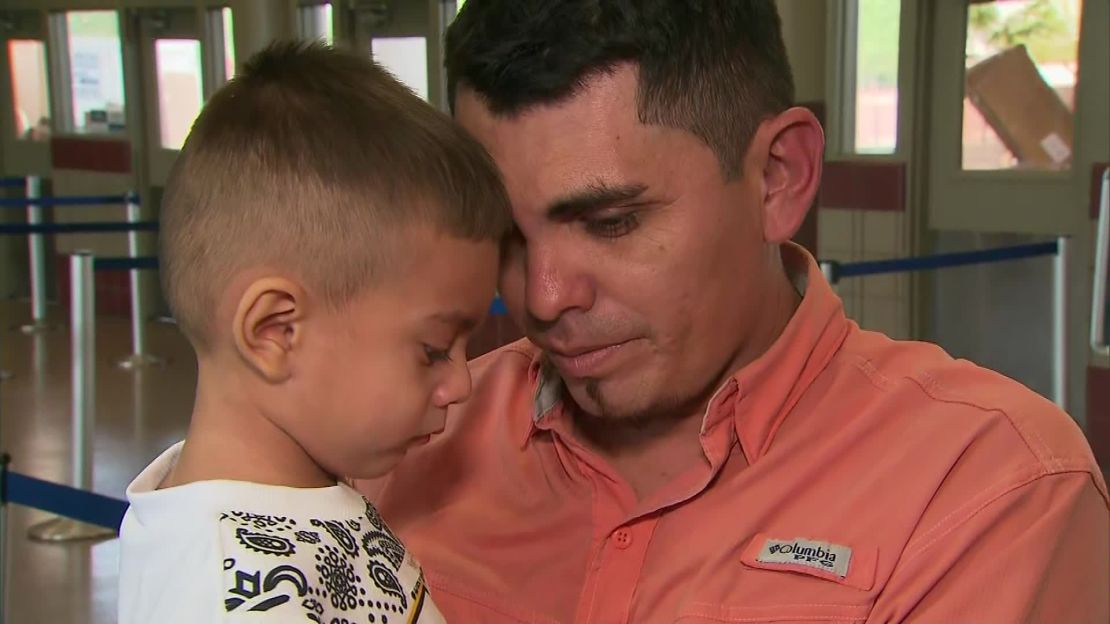Ever Reyes Mejia held his son for the first time since they were separated months ago, and pressed his forehead against the smiling toddler’s face. They stood outside a US Customs and Immigration Center in Michigan, Mejia clutching his son’s Teenage Mutant Ninja Turtles backpack.
Tuesday marked the government’s court-ordered deadline to return children under 5 years old, who were recently separated from their parents at the US border, to their families. The government earlier said it wouldn’t be able to reunite all those children by the deadline.
Mejia’s son was one of three children reunited with their Honduran fathers in Grand Rapids on Tuesday. Reunifications also took place in other states, including Texas and Arizona.
Thirty-eight children under 5 years old, of the 102 identified, were returned to their families by Tuesday evening, according to a Health and Human Services official and an administration official. The HHS official said more reunions would be continuing “throughout the night.”
“It has been a chaotic day,” immigration rights attorney Abril Valdes told CNN affiliate WOOD outside the Grand Rapids center.
“We’ve been trying to get these parents reunified with their 3-year-olds, and we’ve been getting the runaround from ICE (Immigration and Customs Enforcement), said Valdes, who works for the American Civil Liberties Union of Michigan. “Not until the last hour did we know it was going to happen here.”
Part of the problem, immigration attorneys said, is that the parents and children are in the custody of different agencies. Parents are being held by ICE, which is part of the Department of Homeland Security. Children are being held by the Office of Refugee Resettlement, which is part of the Department of Health and Human Services.
The weeks or months of separation have taken a serious toll on the children, Valdes said. One 3-year-old boy who was waiting for reunification Tuesday is now “just a shell of himself,” she said.
“He’s not really talking,” she said. “He’s not the spunky 3-year-old that he always is. He’s hardly saying anything or crying.”

A father’s wish to be there on his son’s birthday
Walter Armando Jimenez Melendez, 29, had been apart from his son for 43 days, he told CNN in Spanish. Fleeing gangs, they left El Salvador to seek asylum in the United States.
Melendez said he was detained in Port Isabel and in Livingston, both in Texas. He didn’t know where they took his son, Jeremy Issac Jimenez.
Immigration officials never told him where the child was located, though he was able to speak to him on the phone twice, Melendez said.
Jeremy turns 5 on Friday, Melendez said.
He had seen news reports that immigrants would be reunited with their children. He said he hoped he would see his son by the weekend.
“I only asked God for it to be by Friday,” he said.
‘We don’t know where their parents are’
Despite the deadline, dozens of toddlers will remain apart from their families while officials work to confirm parent-child relationships through DNA testing and find parents who’ve been released from custody or deported.
“There’s eight children here in Michigan that are under the age of 5 that need to be reunified by today, according to the court order,” Valdes said early Tuesday afternoon.
But out of those eight, only three had a chance at imminent reunification. Those three met their parents later Tuesday.
As for the others, “one parent has already been deported … and then the other four, we don’t know where their parents are, and we don’t know when the reunifications are going to take place,” Valdes said.
The ACLU has said networks of attorneys and NGOs will work to help the government locate and communicate with deported parents. Officials are scheduled to discuss that procedure in court later this week.
But in the meantime, across the country, many young migrant children from separated families will have to wait longer to see their moms and dads.
According to the latest information released in court, the parents of at least 12 children under age 5 have already been deported. The total number of parents who were separated from their kids and deported without them is likely far higher.
Officials defend pace of reunifications
Government officials said they’re taking precautions to ensure the safety of the children, which is part of the reason why it’s taking a while to reunite families.
“Our process may not be as quick as some would like, but there is no question that it is protecting children,” Chris Meekins of the Department of Health and Human Services told reporters Tuesday.
“Let me be clear: HHS could have transferred every child out of ORR care to a parent who is in DHS custody today, if we did not take into account child safety or if the adult is actually a parent.”
Government starts DNA testing for separated kids and parents
‘We were thrilled for them’
While much work is left to be done, some young children and caretakers celebrated in Phoenix on Tuesday.
Two vans seen leaving children’s facilities in Phoenix were carrying youngsters to be reunited with their parents, a source with knowledge of the transfer said.
Juan Sánchez, CEO of the children’s aid group Southwest Key, said his staff helped prepare children in its care for their reunifications Tuesday.
“Our staff came in early, made sure every backpack was full and every child got a hug and a goodbye,” he said. “And the kids hugged us back. They were excited to be on their way to be with their families. And we were thrilled for them.”

‘I’m going step by step’
In Arizona, Josue Rodriguez kissed his 3-year-old son’s neck after being separated from him for 40 days.
Rodriguez said his son hasn’t said much to him. “Dad, where were you?” Rodriguez recalled the toddler asking. “I missed you.”
Like many immigrants, Rodriguez fled crime and poverty in Honduras, he said in Spanish during an interview at a Greyhound bus station.
Rodriguez said he was turned away at an official border crossing in Texas four times before crossing illegally to claim asylum. He said he was told that new rules meant he and his son had to be separated.
He would not have come to the United States if he’d known he would be separated from his son, Rodriguez said.
Rodriguez said he was bound for Virginia with his family, where he will have to convince a judge his life will be in danger if he is sent home.
“I’m going step by step, by what God says,” Rodriguez said.
‘I want everything for him to be happiness’
In Texas, Melendez’s prayer was answered: He and his son were together again by Friday.
Melendez held him tight, kissing him on the forehead and burying his head in his son’s shoulder.
Now the two of them are bound for Rock Hill, South Carolina, he said, where Melendez’s wife and 9-year-old stepson have lived for more than a year. His next court date is July 30.
Melendez cried briefly and wiped his tears away.
“Sometimes I try to be strong because I don’t want to show him sadness,” he said. “From here on out, I want everything for him to be happiness, that he tries to forget all of this time that he was separated from me as soon as possible.”
CORRECTION: An earlier version of this article incorrectly stated the Southern Poverty Law Center represented Honduran native Josue Rodriguez.
CNN’s Rosa Flores, Tal Kopan, Catherine E. Shoichet, Chuck Johnston, Devon Sayers, Scott McLean, Paul Vercammen, Augie Martin, Laura Jarrett, Jamiel Lynch, Elwyn Lopez, Scott McLean and Nick Valencia contributed to this report.








